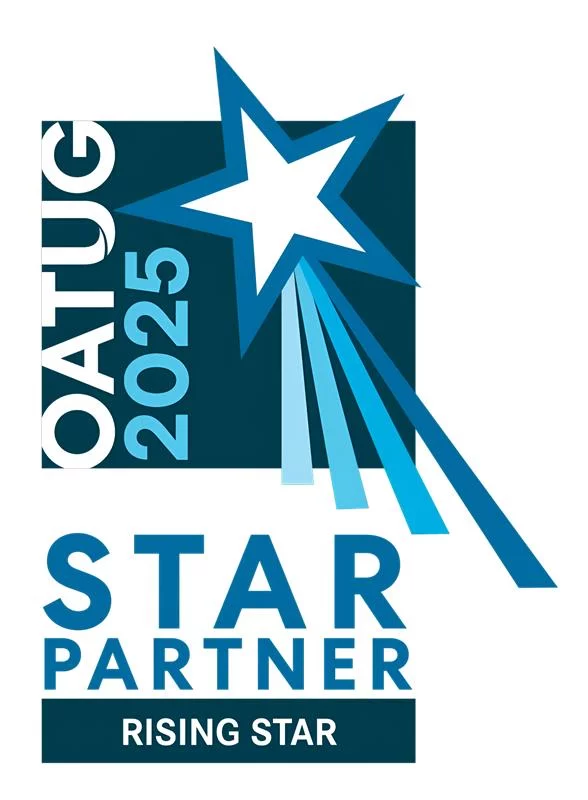Oracle Cloud Infrastructure Security
Secure your cloud foundation with confidence.


Why Choose Rapidflow for OCI Security?
- Proven expertise in Oracle Cloud security architecture and compliance
- End-to-end implementation and lifecycle management of security services
- Ongoing support, monitoring, and optimization of your cloud environment
- Scalable solutions tailored to your business and industry needs
OCI Security Overview
Oracle Cloud Infrastructure provides a secure-by-design architecture with end-to-end protections across identity, network, compute, and data layers. Rapidflow delivers strategic implementation, configuration, and ongoing support to ensure enterprise-grade cloud security that aligns with your business and regulatory requirements.
A secure cloud begins with a secure network. Using Virtual Cloud Networks (VCNs), subnets, route tables, security lists, and Network Security Groups (NSGs), we architect environments that isolate workloads, control traffic flows, and minimize attack surfaces.
Next-generation firewalls in OCI provide advanced traffic inspection and threat prevention. We deploy and manage firewall rules, application layer filtering, and policy enforcement to protect against unauthorized access and malicious activity.
OCI Load Balancers ensure high availability and scalability for applications. We implement secure load balancing with SSL/TLS encryption, automated certificate management, and health checks—ensuring traffic is efficiently and securely routed.
The OCI Web Application Firewall safeguards applications from common web threats such as SQL injection, cross-site scripting (XSS), and DDoS attacks. Rapidflow configures WAF rules tailored to your applications, ensuring continuous protection and compliance with OWASP standards.
OCI IAM enables fine-grained control over user access to cloud resources. Through robust role-based access policies, multi-factor authentication, and federation capabilities, we implement secure and scalable access frameworks that minimize risk and ensure accountability.
Access Governance simplifies identity lifecycle management and strengthens compliance. Rapidflow helps organizations automate user access reviews, enforce least-privilege principles, and reduce the risk of unauthorized access through policy-based controls and reporting.

Compute Security, Bastion, and OS Management Hub
We protect compute instances using OCI Bastion for secure, controlled access and OS Management Hub for automated patching and compliance. This ensures infrastructure is hardened, regularly updated, and centrally monitored for potential vulnerabilities.
Key Management Service (KMS)
KMS provides centralized encryption key management to secure data at rest. Rapidflow helps organizations manage key lifecycles, enforce access controls, and support compliance with industry standards like FIPS 140-2.
Cloud Guard
Cloud Guard continuously monitors OCI resources for misconfigurations, risky behavior, and threats. We enable and fine-tune Cloud Guard policies and responders to ensure fast, automated remediation and consistent security posture management.
Vulnerability Scanning Service (VSS)
OCI VSS provides continuous visibility into vulnerabilities across compute resources. We configure and manage scan schedules, review findings, and assist in remediating issues to maintain a strong security posture across your environment.
Operate
Oracle Data Safe offers a suite of tools for database security, including user risk assessment, activity auditing, sensitive data discovery, and data masking. Rapidflow configures and monitors these capabilities to protect your data and meet compliance objectives.
Threat Intelligence & Security Zones
Oracle Threat Intelligence provides curated data feeds to identify and mitigate known threats. Security Zones enforce predefined security best practices, helping prevent misconfigurations and ensuring secure-by-default deployments.


Security Operations
Zero Trust Security on Oracle Cloud Infrastructure
Understand what you need to protect before you enforce protections
We help clients visualize their OCI landscape, map dependencies, and identify hidden risks early
- Inventory users, apps, networks, and services – Identify everything running in your OCI environment to prevent blind spots.
- Tag resources and standardize naming – Organize assets for easier policy enforcement and access control.
- Visualize data flows and shadow IT – Detect unapproved usage and secure sensitive pathways.
- Define trust boundaries early – Establish zones where specific trust and controls apply.
- Use federated identity for human users – Connect enterprise directories for consistent identity management.
- Secure non-human access via principals – Use service principals for API access and automation.
- Register and manage trusted devices – Recognize only compliant devices to reduce exposure.
- Segment identities by roles and functions – Assign permissions based on business roles.
- Evaluate patch levels and vulnerabilities – Detect outdated software and unpatched services.
- Track behavioral anomalies and risks – Monitor abnormal activity that could signal compromise.
- Correlate logs with threat intelligence – Use real-time intelligence to identify potential attacks.
- Validate device and workload integrity – Ensure trusted software is running in trusted environments.
We design fine-grained, adaptive access policies that enforce Zero Trust principles across OCI
- Implement least privilege principles – Give users and services only the access they need.
- Use tags and compartments for boundaries – Structure resources logically to isolate access.
- Apply conditional policies based on roles – Adapt access based on context like time, location, or risk.
- Reassess entitlements regularly – Audit and remove unnecessary permissions over time.
Visibility across all layers is essential. Monitoring activities and environment changes helps detect threats early and enables faster, more effective responses
- Collect audit logs and metrics continuously – Capture and retain activity for compliance and detection.
Use centralized monitoring and alerting – Detect issues and threats in real time.
- Detect abnormal privilege usage or drift – Identify when users exceed normal behavior patterns.
- Feed findings into automated response tools – Trigger remediation with Cloud Guard or external SIEMs.
Rapidflow helps you leverage Oracle’s secure-by-default services from day one
- Apply Security Zones for enforced policies – Prevent misconfigurations at the infrastructure level.
- Use Vault for key and secret management – Protect encryption keys and credentials securely.
- Monitor sensitive data via Data Safe – Audit, mask, and classify database activity.
- Automate with secure-by-default infrastructure – Use services that align with Zero Trust principles out-of-the-box.
Frequently Asked Questions
Oracle Cloud Infrastructure is built on a security-first architecture. It offers isolated network
virtualization, always-on encryption, and integrated threat detection. Unlike some platforms, OCI
embeds Zero Trust principles natively across identity, access, network, and data layers-ensuring
comprehensive control and visibility.
OCI adopts Zero Trust by enforcing identity verification at every step, eliminating implicit trust,
and continuously assessing risk and behavior. Tools like Cloud Guard, Security Zones, and Identity
and Access Management (IAM) policies help implement strict access controls and monitoring.
Oracle Cloud Guard automatically detects and responds to misconfigurations and threats across
OCI resources. It evaluates logs, events, and configurations, then triggers alerts or remediation
actions to help maintain compliance and reduce risk.
OCI encrypts data at rest and in transit by default. Customers can manage encryption keys using
Oracle Cloud Infrastructure Vault, which provides lifecycle management, secure storage, and
optional HSM-based protection for encryption keys and secrets.
OCI offers Vulnerability Scanning Service (VSS) to identify known vulnerabilities in compute
instances and container images. This service supports continuous scanning, severity ratings, and
integration with OCI Security services for remediation workflows.
Yes. OCI IAM allows fine-grained access control using policies, compartments, and dynamic
groups. You can apply conditional access based on user attributes, resource tags, or network
context to implement least-privilege principles effectively.
Oracle Bastion provides a secure, managed jump server for administrators to connect to private
compute instances without needing public IPs. Sessions are logged and access is restricted by
policy, reducing the attack surface.
Security Zones enforce pre-defined security policies on compartments. When enabled, they
prevent insecure configurations, such as public storage buckets or open databases, helping ensure
that resources comply with organizational security standards by default.
OCI provides centralized logging, auditing, and metrics across services. Threat detection tools
like Cloud Guard, logging analytics, and third-party SIEM integrations enable real-time monitoring,
anomaly detection, and automated response.
Yes. OCI meets a wide range of compliance requirements including ISO 27001, SOC 1/2/3,
GDPR, HIPAA, and FedRAMP (for US Government workloads). Detailed compliance documentation
is available via the Oracle Cloud compliance portal.





